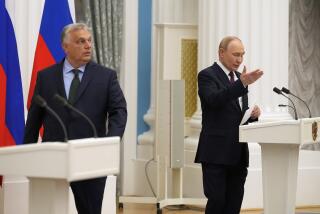NEWS ANALYSIS : Refugee Flow Adds to Strains in East Europe
- Share via
PASSAU, West Germany — The rising exodus of East German refugees into West Germany across the newly opened Austro-Hungarian frontier Monday underscored a critical situation developing between East and West Germany, with Hungary caught tightly in the middle.
The tide of emigration, which hard-line Communist authorities in East Berlin strongly oppose, threatens ties between East and West Germany, between Hungary and East Germany within the Communist Bloc--and even raises prematurely the momentous question of German reunification.
American experts said in Washington that the Hungarian government clearly has decided that it has more to gain from friendship with affluent West Germany than from its traditional alliance with East Germany. But these analysts said that the key question--as yet unanswered--is whether the Soviet Union will permit the continued erosion of its once-formidable empire.
“Obviously, this is a major complication in Hungary’s relations with the GDR (East Germany), and it obviously complicates empire management for the Soviet Union,” said Helmut Sonnenfeldt, a former State Department and National Security Council expert on the Soviet Union and Eastern Europe. “It is another joker in the deck.”
Sonnenfeldt, now on the staff of the Brookings Institution in Washington, said that Hungary’s motivation was a combination of altruism and selfishness.
Hungarians ‘Being Good Guys’
“Partly they (Hungarians) are being good guys,” Sonnenfeldt said. “You can’t really open up the system and gradually remove repression, as the Hungarians hope to do, and then play the game with the East Germans of sending these people back.
“I assume they also have it in mind that the West Germans will repay them in some form,” he said. “It is part of the Hungarian effort to convince the outside world . . . that they are a different breed of cat from the rest of Eastern Europe. From the Hungarian standpoint, it is probably a worthwhile exchange.”
Meanwhile, the East German government on Monday criticized both West Germany and Hungary in unprecedented language. Its official news agency said of West Germany: “It is an unprecedented event in international life relating to a sovereign state. It is open interference in the internal affairs of East Germany.”
The East German news agency added that the westward movement of the refugees is an “ice-cold trade in East Germans and pieces of silver for Hungary.”
The exodus points up a bitterly unpalatable fact of life for East Germany: Its citizens are reacting adversely to the hard-line regime and taking their children with them.
Regime’s Future Imperiled
The exodus does not threaten the immediate existence of East Germany, but it menaces the future of a Communist regime whose arteries have hardened and which has, so far, flatly turned its back on notions of reform.
Sonnenfeldt said in Washington that he does not expect the Kremlin to interfere with Hungary’s liberalization because Soviet President Mikhail S. Gorbachev apparently hopes that an economic revival in Eastern Europe will eventually extend to the Soviet Union. Also, he said, it would be more difficult for Moscow to crack down on Budapest today than it was in 1956.
“The Russians are partly encouraging this because they seem to think that these countries will somehow get on their feet and the Soviet Union will benefit,” he said. “I think they’ve got a tiger by the tail. They haven’t come up with a formula yet. It could get pretty messy. If it does get messy in terms of bloodshed, repression and so forth, the major victim will be perestroika and any chance for economic advancement in the Soviet Union itself.”
However, George Carver, a former deputy director of the CIA, predicted that Moscow would ultimately have to crack down on Hungary to prevent further erosion of its authority within the Soviet Union.
“I would love to see the Soviet empire break up,” said Carver, who is now on the staff of the Center for Strategic and International Studies in Washington. “But empires seldom break up without a lot of tension and bloodshed. We may find ourselves faced with Tian An Men Square cubed,” he said in a reference to the Chinese massacre last June of pro-democracy students in Beijing.
‘Don’t Count on It’
“Things may be different than 1956 but I don’t think we should count on it,” Carver said. “We are always hoping that world opinion will force these guys to behave--baloney.”
California Rep. Tom Lantos (D-San Mateo) said Hungary seems to be on “a steady course” of democratization. But he said the Hungarian reforms could not survive if the Soviet Union reverses its own reformist course.
Michael J. Sodaro, a professor of international affairs at George Washington University in Washington, said that Moscow seems to have lost control of events in Budapest but still hopes to push things toward a favorable outcome in East Berlin.
“This is a major crisis for the GDR,” said Sodaro, author of several books on Eastern Europe and the divided German states. “Moscow’s attitude toward events in Eastern Europe is one of permissive befuddlement. The Soviets genuinely don’t know what to do.”
Meanwhile, the refugee flood threatens the prestige, if not the immediate power, of Erich Honecker, East Germany’s 77-year-old leader, who is seriously--some say terminally--ill. But who will come after Honecker?
Other Leaders Opposed
Analysts say that most of the other top people in his inner circle are as opposed to Gorbachev-style reforms as he is.
“But how long can they hold on?” asked one Bonn-based specialist on East Germany. “They are losing their best young people. They are all going to have to face up to the terrible fact that socialism has just not measured up for most East Germans--when compared to their West German kinfolk.”
George Washington University’s Sodaro said that Honecker is sure to relinquish power sooner or later. He said that Moscow has made it clear that it wants a new regime in East Berlin that would have far more popular appeal than the present one. He also said that if East Germans obtained even the limited freedoms that Poles and Hungarians have enjoyed for years, many of them would be reluctant to risk flight to the West.
But to date, the East German regime has been incapable of introducing the kind of reforms that might liberalize its economy and make its politics more popular.
Party ideologist Otto Reinhold put it this way recently: East Germany, with no independent culture or language, exists only because it is a socialist state. Yet today, East German citizens are rejecting East German socialism.
Concern Over Implosion
For that reason, some political observers in West Germany worry that there may be an eventual collapse of the regime, some kind of political implosion, that could seriously weaken the Communist state. Such a collapse could lead to East Germany’s moving toward the West--much more quickly than anyone thought just a few years--or months--ago.
Commentators have warned that Bonn has been ill-prepared for some sudden crisis in East Germany that could endanger the regime with totally unforeseen consequences.
For too many years, these commentators say, West Germany has assumed that reunification would eventually happen--but not in anyone’s lifetime. And, therefore, there was no need to make specific plans for such a vague eventuality.
“We may be seeing this much sooner than anyone expected,” a diplomat in East Berlin said recently.
German Question on Agenda
West German Chancellor Helmut Kohl, currently in Bremen for the annual Christian Democratic Union conference, said last week about the refugee crisis: “The developments of the past few weeks have made clear that the German Question has stayed on the agenda of world politics. It has not been dumped in the garbage heap of history. The Germans’ will for unity in freedom is unbroken.
“As for the solution of the German question, not only the Germans have to answer it. Many people will have to consider it in the period ahead of us, especially those responsible.”
Tuohy reported from West Germany and Kempster reported from Washington.
More to Read
Sign up for Essential California
The most important California stories and recommendations in your inbox every morning.
You may occasionally receive promotional content from the Los Angeles Times.













